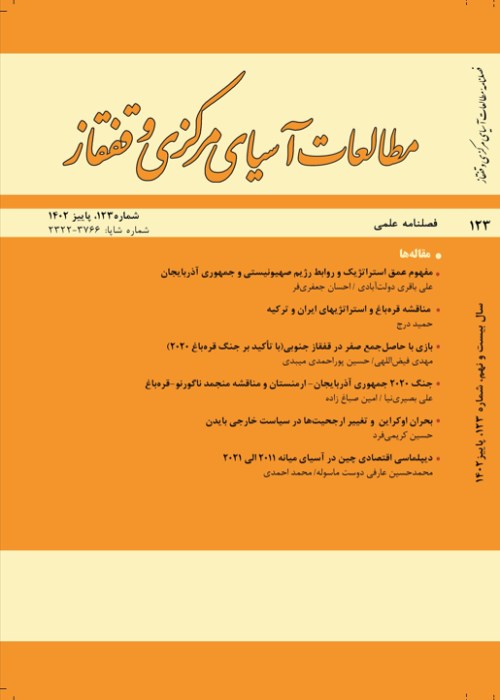Mountainous Karabakh from the Perspective of International Law
Abstract:
The Republics of Azerbaijan and Armenia as the two main parties in the Karabakh conflict try to strengthen their positions through the principles of international law. Azerbaijan addresses the principle of territorial integrity of the UN and as per many international treaties and likewise conventions claiming the need of withdrawal for Armenian military forces from Karabakh and specifically denying the independence announcement of this area. However، Armenia and Self-proclaimed Republic of Karabakh adhere to the principle of self-determination، in the consent of independence of Mountainous Karabakh and even its incorporation with Armenia to be assumed the right of the local people. They also believe that، in this regard، a referendum held in 1993، and since then، several presidential، parliamentary and local authority elections have been held in Karabakh. The purpose of this article is to assess occupation of Karabakh، the positions of the parties and the players in this conflict from the perspective of the international law. As a matter of fact، this article seeks to answer the following question: To what extent the adherence to the principle of territorial integrity of Azerbaijan and Armenian separatists in Karabakh and Armenia stance on the principle of self-determination، is reasonable and is in accordance with international law? Are these two principles which are called by the international lawyers as jus cogens، in conflict with each other or the two sides of the Karabakh conflict are having a unidirectional concept of the issue? A provisional answer to this question as an assumption is that after the end of the colonial period، as per international law، for ethnic minorities within the country، the right of self-determination is excluding the territorial separatism and decomposition but including the right of participation in the election of executive، legislative authorities and other aspects of civic and political contribution، as well as to preserve the cultural heritage.
Keywords:
Language:
Persian
Published:
Journal of Central Asia and The Caucasus Studies, Volume:20 Issue: 85, 2014
Pages:
1 to 33
magiran.com/p1452513
دانلود و مطالعه متن این مقاله با یکی از روشهای زیر امکان پذیر است:
اشتراک شخصی
با عضویت و پرداخت آنلاین حق اشتراک یکساله به مبلغ 1,390,000ريال میتوانید 70 عنوان مطلب دانلود کنید!
اشتراک سازمانی
به کتابخانه دانشگاه یا محل کار خود پیشنهاد کنید تا اشتراک سازمانی این پایگاه را برای دسترسی نامحدود همه کاربران به متن مطالب تهیه نمایند!
توجه!
- حق عضویت دریافتی صرف حمایت از نشریات عضو و نگهداری، تکمیل و توسعه مگیران میشود.
- پرداخت حق اشتراک و دانلود مقالات اجازه بازنشر آن در سایر رسانههای چاپی و دیجیتال را به کاربر نمیدهد.
In order to view content subscription is required
Personal subscription
Subscribe magiran.com for 70 € euros via PayPal and download 70 articles during a year.
Organization subscription
Please contact us to subscribe your university or library for unlimited access!


